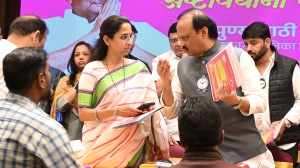Stay updated with the latest - Click here to follow us on Instagram
Capturing change
Delhi-based filmmaker Vijay Jodha doesnt like to call himself a climate change crusader.
He has made many films on environment and climate change but filmmaker Vijay Jodhas latest film tracks the life of a migrant in Delhi
Delhi-based filmmaker Vijay Jodha doesnt like to call himself a climate change crusader. The purpose behind making any film is so a large number of people can benefit from it after they see it. When I make films on climate change,I like to pick on aspects that nobody has heard of and therefore unable to judge its impact on their lives, says Jodha.
His film,The Weeping Apple Tree,that documents the adverse effects of climate change,is currently being screened at eight cities including Port Blair,as part of a travelling environment film festival. This will be the first time Port Blair will have a film screening on climate change. It is significant since this will be the first place to go under water as an effect of climate change, adds Jodha who made the film in 2006 after receiving a UK Environment Film Fellowship Award from the British Council.
The Weeping Apple Tree focuses on a niche issue which people have overlooked,the shifting apple-growing belt in the low lying regions of Kullu-Manali. For over two decades,an entire stretch of land known for its rich apple growing farms has not seen any cultivation of apples. We brought in scientific researchers to document for us the causes behind this phenomenon and explained to the locals what was happening to their farms. The film also shows how the people have adapted to these drastic changes inflicted on their livelihood, explains Jodha.
Although this film was made four years ago,it has received a significant audience over the years. In June 5,2007,the 12-minute film was broadcast on Discovery Network to mark World Environment Day. Last year,United Nations Development Programme and UNICEF used the film to promote a climate change awareness programme in Rajasthan.
Meanwhile,Jodha has moved on to other projects. A graduate of the New York Universitys Film Academy,Jodha worked on a few commercial projects in Mumbai before assisting his brother Samar in a book that was essentially a photo-essay on the elderly. He followed it uo by making a film on the tribals of Assam whose livelihood depends on the forest.
Jodhas films,though,are not restricted to the forests and fields. His latest venture,The Other Factor,is about a migrant worker from Varanasi who makes a living writing peoples names on rice grains at the India Gate lawns. Hes also in the midst of post-production work on two biopics on the life of two Indian artists: Paritosh Sen and Prakash Karmakar.
There hasnt been any significant body of work on senior artists in India who talk about their life in their own words, says Jodha.







